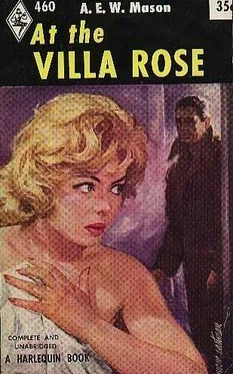A Mason - At the Villa Rose
Здесь есть возможность читать онлайн «A Mason - At the Villa Rose» весь текст электронной книги совершенно бесплатно (целиком полную версию без сокращений). В некоторых случаях можно слушать аудио, скачать через торрент в формате fb2 и присутствует краткое содержание. Год выпуска: 1910, Жанр: Классический детектив, на английском языке. Описание произведения, (предисловие) а так же отзывы посетителей доступны на портале библиотеки ЛибКат.
- Название:At the Villa Rose
- Автор:
- Жанр:
- Год:1910
- ISBN:нет данных
- Рейтинг книги:5 / 5. Голосов: 1
-
Избранное:Добавить в избранное
- Отзывы:
-
Ваша оценка:
- 100
- 1
- 2
- 3
- 4
- 5
At the Villa Rose: краткое содержание, описание и аннотация
Предлагаем к чтению аннотацию, описание, краткое содержание или предисловие (зависит от того, что написал сам автор книги «At the Villa Rose»). Если вы не нашли необходимую информацию о книге — напишите в комментариях, мы постараемся отыскать её.
At the Villa Rose — читать онлайн бесплатно полную книгу (весь текст) целиком
Ниже представлен текст книги, разбитый по страницам. Система сохранения места последней прочитанной страницы, позволяет с удобством читать онлайн бесплатно книгу «At the Villa Rose», без необходимости каждый раз заново искать на чём Вы остановились. Поставьте закладку, и сможете в любой момент перейти на страницу, на которой закончили чтение.
Интервал:
Закладка:
"When M. Ricardo has put that away," he said, "we will hear what Helene Vauquier has to tell us."
He passed out of the door last, and, locking it, placed the key in his pocket.
"Helene Vauquier’s room is, I think, upstairs," he said. And he moved towards the staircase.
But as he did so a man in plain clothes, who had been waiting upon the landing, stepped forward. He carried in his hand a piece of thin, strong whipcord.
"Ah, Durette!" cried Besnard. "Monsieur Hanaud, I sent Durette this morning round the shops of Aix with the cord which was found knotted round Mme. Dauvray’s neck."
Hanaud advanced quickly to the man.
"Well! Did you discover anything?"
"Yes, monsieur," said Durette. "At the shop of M. Corval, in the Rue du Casino, a young lady in a dark-grey frock and hat bought some cord of this kind at a few minutes after nine last night. It was just as the shop was being closed. I showed Corval the photograph of Celie Harland which M. le Commissaire gave me out of Mme. Dauvray’s room, and he identified it as the portrait of the girl who had bought the cord."
Complete silence followed upon Durette’s words. The whole party stood like men stupefied. No one looked towards Wethermill; even Hanaud averted his eyes.
"Yes, that is very important," he said awkwardly. He turned away and, followed by the others, went up the stairs to the bedroom of Helene Vauquier.
CHAPTER VI
A nurse opened the door. Within the room Helene Vauquier was leaning back in a chair. She looked ill, and her face was very white. On the appearance of Hanaud, the Commissaire, and the others, however, she rose to her feet. Ricardo recognised the justice of Hanaud’s description. She stood before them a hard-featured, tall woman of thirty-five or forty, in a neat black stuff dress, strong with the strength of a peasant, respectable, reliable. She looked what she had been, the confidential maid of an elderly woman. On her face there was now an aspect of eager appeal.
"Oh, monsieur!" she began, "let me go from here-anywhere-into prison if you like. But to stay here-where in years past we were so happy-and with madame lying in the room below. No, it is insupportable."
She sank into her chair, and Hanaud came over to her side.
"Yes, yes," he said, in a soothing voice. "I can understand your feelings, my poor woman. We will not keep you here. You have, perhaps, friends in Aix with whom you could stay?"
"Oh yes, monsieur!" Helene cried gratefully. "Oh, but I thank you! That I should have to sleep here tonight! Oh, how the fear of that has frightened me!"
"You need have had no such fear. After all, we are not the visitors of last night," said Hanaud, drawing a chair close to her and patting her hand sympathetically. "Now, I want you to tell these gentlemen and myself all that you know of this dreadful business. Take your time, mademoiselle! We are human."
"But, monsieur, I know nothing," she cried. "I was told that I might go to bed as soon as I had dressed Mlle. Celie for the seance."
"Seance!" cried Ricardo, startled into speech. The picture of the Assembly Hall at Leamington was again before his mind. But Hanaud turned towards him, and, though Hanaud’s face retained its benevolent expression, there was a glitter in his eyes which sent the blood into Ricardo’s face.
"Did you speak again, M. Ricardo?" the detective asked. "No? I thought it was not possible." He turned back to Helene Vauquier. "So Mlle. Celie practised seances. That is very strange. We will hear about them. Who knows what thread may lead us to the truth?"
Helene Vauquier shook her head.
"Monsieur, it is not right that you should seek the truth from me. For, consider this! I cannot speak with justice of Mlle. Celie. No, I cannot! I did not like her. I was jealous-yes, jealous, Monsieur, you want the truth-I hated her!" And the woman’s face flushed and she clenched her hand upon the arm of her chair. "Yes, I hated her. How could I help it?" she asked.
"Why?" asked Hanaud gently. "Why could you not help it?"
Helene Vauquier leaned back again, her strength exhausted, and smiled languidly.
"I will tell you. But remember it is a woman speaking to you, and things which you will count silly and trivial mean very much to her. There was one night last June-only last June! To think of it! So little while ago there was no Mlle. Celie-" and, as Hanaud raised his hand, she said hurriedly, "Yes, yes; I will control myself. But to think of Mme. Dauvray now!"
And thereupon she blurted out her story and explained to Mr. Ricardo the question which had so perplexed him: how a girl of so much distinction as Celia Harland came to be living with a woman of so common a type as Mme. Dauvray.
"Well, one night in June," said Helene Vauquier, "madame went with a party to supper at the Abbaye Restaurant in Montmartre. And she brought home for the first time Mlle. Celie. But you should have seen her! She had on a little plaid skirt and a coat which was falling to pieces, and she was starving-yes, starving. Madame told me the story that night as I undressed her. Mlle. Celie was there dancing amidst the tables for a supper with any one who would be kind enough to dance with her."
The scorn of her voice rang through the room. She was the rigid, respectable peasant woman, speaking out her contempt. And Wethermill must needs listen to it. Ricardo dared not glance at him.
"But hardly any one would dance with her in her rags, and no one would give her supper except madame. Madame did. Madame listened to her story of hunger and distress. Madame believed it, and brought her home. Madame was so kind, so careless in her kindness. And now she lies murdered for a reward!" An hysterical sob checked the woman’s utterances, her face began to work, her hands to twitch.
"Come, come!" said Hanaud gently, "calm yourself, mademoiselle."
Helene Vauquier paused for a moment or two to recover her composure. "I beg your pardon, monsieur, but I have been so long with madame-oh, the poor woman! Yes, yes, I will calm myself. Well, madame brought her home, and in a week there was nothing too good for Mlle. Celie. Madame was like a child. Always she was being deceived and imposed upon. Never she learnt prudence. But no one so quickly made her way to madame’s heart as Mlle. Celie. Mademoiselle must live with her. Mademoiselle must be dressed by the first modistes. Mademoiselle must have lace petticoats and the softest linen, long white gloves, and pretty ribbons for her hair, and hats from Caroline Reboux at twelve hundred francs. And madame’s maid must attend upon her and deck her out in all these dainty things. Bah!"
Vauquier was sitting erect in her chair, violent, almost rancorous with anger. She looked round upon the company and shrugged her shoulders.
"I told you not to come to me!" she said, "I cannot speak impartially, or even gently of mademoiselle. Consider! For years I had been more than madame’s maid-her friend; yes, so she was kind enough to call me. She talked to me about everything, consulted me about everything, took me with her everywhere. Then she brings home, at two o’clock in the morning, a young girl with a fresh, pretty face, from a Montmartre restaurant, and in a week I am nothing at all-oh, but nothing-and mademoiselle is queen."
"Yes, it is quite natural," said Hanaud sympathetically. "You would not have been human, mademoiselle, if you had not felt some anger. But tell us frankly about these seances. How did they begin?"
"Oh, monsieur," Vauquier answered, "it was not difficult to begin them. Mme. Dauvray had a passion for fortune-tellers and rogues of that kind. Any one with a pack of cards and some nonsense about a dangerous woman with black hair or a man with a limp-Monsieur knows the stories they string together in dimly lighted rooms to deceive the credulous-any one could make a harvest out of madame’s superstitions. But monsieur knows the type."
Читать дальшеИнтервал:
Закладка:
Похожие книги на «At the Villa Rose»
Представляем Вашему вниманию похожие книги на «At the Villa Rose» списком для выбора. Мы отобрали схожую по названию и смыслу литературу в надежде предоставить читателям больше вариантов отыскать новые, интересные, ещё непрочитанные произведения.
Обсуждение, отзывы о книге «At the Villa Rose» и просто собственные мнения читателей. Оставьте ваши комментарии, напишите, что Вы думаете о произведении, его смысле или главных героях. Укажите что конкретно понравилось, а что нет, и почему Вы так считаете.






